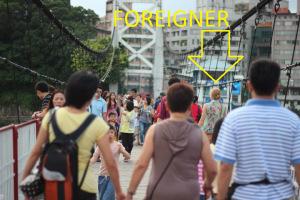
This sign follows us everywhere.
- “Waiguoren (wai4guo2ren2/外國人 = ‘foreigner’), waiguoren, waiguoren!” the small purple-shirted child chants while pounding his pudding fists into each other over and over again. We sit there in the barbecue restaurant (the ubiquitous 熱炒/re4chao3) staring back at that innocent, cherub-faced child and his not so innocent chant. Eventually, after about a minute, an adult comes over and whisks the tiny chanter away for some other fun. Our dinner goes on. But, later on, we thought about this fact and knew we had to comment on the scene described above. In Taiwan, if you are a foreigner you stick out like a sore thumb. It is not diverse like the U.S., or many other countries around the world. Thus, it is expected that there will be some staring, pointing, and, occasionally, not so discreet picture taking. (Although, it must be said, these three things also get old.) But, the one thing that really stands out to us is the use of the word “waiguoren” constantly. Now that we have been learning Chinese, we are starting to notice and understand the people around us talking about us more and more. Certainly, small children like the one described above get a bit of a pass. Beyond that, though, is the fact that it is used by small children and adults alike. Do the adults chant and smash fists together? No. Is it really acceptable regardless? We’re not convinced either way. Is it particularly offensive to us? No, not really. Is it a bit annoying when everyone on a train car is talking about you because you are a foreigner? Yes. We understand that because there are not many foreigners here, we are more noticeable. What we don’t understand is why this makes it okay to constantly be talking about this or that foreigner. The kids get it from somewhere. In the end, this is just an interesting point of living life abroad in Taiwan. We’re just glad our experiences have never really been hostile.
- (Student doesn’t do homework.) Teacher, “ARGGG!” (Student gets picked up by Mom or Dad after being in school, after school programs, English classes, and study hall for 12 hours.) Teacher, “That is terrible. Poor kid.” This conflict has been common to us since moving to Taiwan to teach English. On one end, as a teacher, you must keep your kids attentive, participating and doing their work in order to ensure that they are actually learning what you’re teaching. It gets truly frustrating as a teacher when students don’t follow this game plan. (Sorry, teachers from the past!) You get frustrated, angry, exasperated, etc. You try reasoning with them. They are seven. Not happening. You try getting angry at them. They are seven. They cry. You try using incentives. This works most of the time. But, there is always that one kid who decides, “Screw that.” Teaching is a never-ending dance between the teacher and the student working in an attempt to create harmony. When that harmony is reached, it can be great. But, not uncommonly, there is a wrench thrown into the system. This can be incredibly frustrating, especially in certain systems that give the teachers absolutely zero leverage. All the time, though, we have noticed that we get angry, frustrated, etc., but then we think about the students’ days here. It is EXTREMELY long. They get to school somewhere between 7:30 am and 9:00 am and don’t leave school activities or their English cram schools (補習班 bu3xi2ban1) until 6:30 pm or later many nights. All that, plus the fact that their workweek is a lot like their parents’ workweek: sometimes 7 days a week. It is truly amazing that an eight year old second grader can be functioning at any level for an almost two hour class from 6:50 pm to 8:40 pm. We were never asked to do such a thing. Certainly, we played some sports and participated in other activities as children. But, in second grade our bedtimes were earlier than these kids are getting done with classes. It’s crazy. In the end, this conflict within ourselves as teachers is one that wages war daily. We have a responsibility for teaching these kids English as best as we can. That means we must push them to work hard and study. But, at the same time, we feel responsible that these kids don’t have much time to do anything other than work hard and study.
- In the U.S. there is the age-old idea of the “spoiled princess.” The girl who gets everything she wants, and, accordingly, acts like she always should and can get everything she wants. Now, we can definitely discuss the merits of this stereotype because we know plenty of boys in the U.S. that are just as spoiled, yet you don’t hear about them. That is for another day, though. Here in Taiwan, the reality is that there are “spoiled princes.” The amount and concentration of spoiled boys here is astounding. Are all boys spoiled? No. Are a hell of a lot of them? Hell, yes. In our school there is a boy who cries nearly every day. He is in first grade, so you may think, “Give the kid a break.” Well, one of his most recent outbreaks was because HE HAD TO WAIT IN FUCKING LINE! Now you’re thinking, “Really?!?” Ya. Really. Certainly, this kid is probably more extreme than most, but he is not an anomaly. Boys here are treated as if they really are little princes and can do no wrong. They punch another kid in the face. Parents say, “The other kid did something first.” They go crazy and curse out and attack some teachers (true story). Parents say, “Just leave him alone and he won’t do that.” They do dirty hand signals toward their teacher and get caught doing so by their own sister. Parents say, “Really? I don’t think he would do that.” The list could go on and on and on and on. Culturally speaking, we understand that traditionally boys are held a little closer due to their perceived carrying-on of the family name. But, seriously, it is out of control here, and I’m sure in other places as well. Not only is it annoying to have to walk on your tippy-toes around these little princes, but the real danger is that this practice is just creating a generation of children that believe they can do no wrong, and will be backed up on that point. Are spoiled children, specifically boys, a reality that only exists in Taiwan? No, not by a long shot. Taiwan just seems to be trying to perfect it in a many ways.
- Finally, who the hell decided that it was a good idea to put squeaky toys in children’s shoes? Yes, here in Taiwan there are shoes with squeaky toys in the soles. And, yes, you guessed it; every time that child moves in any direction there is a loud, high-pitched squeak. This must have been an experiment by some parent who thought, “I don’t want to put a leash (another thing entirely; we’re looking at you parents with child leashes) on my child, but I don’t want to lose my child either. Hmm…GOT IT! Squeaky shoes.” That same parent after twenty-four hours of non-stop squeaking shoes; “Holy shit!!! What have I done? I’ll just carry the damn kid.” Somewhere, at some time in those first twenty-four hours another parent saw and heard those shoes and was like, “I need to try that.” Thus, the monster was created. Well, either the above scenario describes the birth of these shoes, or it went something like this: An evil child mastermind thought, “Man, I hate walking, but I also hate strollers. You know what I love? Being carried. What to do? Hmmm…GOT IT! Squeaky shoes! They’ll never be able to stand me walking around in something so diabolically annoying.” Either scenario, these things are terrible!
____________________________________________________________
Thoughts, comments, concerns? As always, leave them below:

